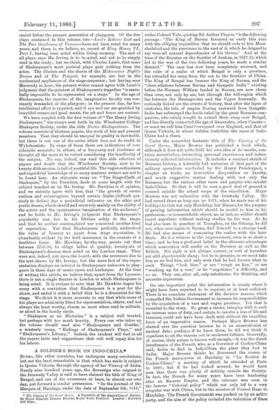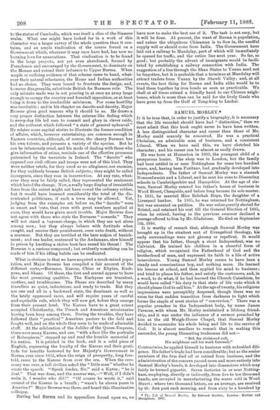A SOLDIER'S BOOK ON INDO-CEIDTA.* Brame, like other countries, has
undergone many revolutions, but not the least remarkable is that which has made it subject tio Queen Victoria, through the agency of her Viceroy of India. Nearly nine hundred years ago, the Sovereign who reigned in the Irrawady Valley is said to have claimed the title of King of Bengal, and one of his successors at least, in almost our own day, put forward a similar pretension. "In the journal of the Marquis of Hastings, under the date of September 6th, 1818,"
• The Coming of the Great queen. A Narrative of the Acquisition of Burma. By Major Edmond Oharles Browne, Royal Scots Fusiliers. London: Harrison and Sons.
writes Colonel Yule, quoting Sir Arthur Phayre," is the following passage : The King of Burma favoured us early this year with the obliging requisition that we should cede to him Moor- shedabad and the provinces to the east of it, which he deigned to say were all natural dependencies of his throne.' And at the time of the disputes on the frontier of Arakan, in 1823.24, which led to the war of the two following years, he made a similar demand." The case has now been completely reversed, and the ruler of a realm of which Bengal is only a province, has extended her sway from the sea to the frontiers of China. The King of Bengal has become the King of Burma, and the "close relations between Burma and Gangetic India" existing before the Norman William landed in Sussex, are now closer than ever, not only by sea, but through the hill-region which lies between the Bramapootra and the Upper Irrawady. So curiously linked are the events of history, that after the lapse of centuries, the tide of empire flowing eastward from Gangetic India has submerged the lands ruled by the great Burmese con- querors, who vainly sought to extend their sway over Bengal, and has directly connected the age of Anaurahta, when Canute— or must we call him Cnut ?—reigned over England, and that of Queen Victoria, in whose Jubilee festivities the races of Indo- China had a share.
Under the somewhat fantastic title of The Coming of the Great Queen, Major Browne has published a book which, although it does not quite fulfil his own idea of its merits, con- tains, nevertheless, interesting personal experiences and indus- triously collected information. It includes a succinct sketch of Burmese history, a tolerably full narrative of that part of the military operations conducted by Sir Henry Prendergast, a chapter on trade, an instructive disquisition on dacoity, and much suggestive matter dealing with not only the Burmese, but the various other races and peoples who inhabit Indo-China. So that it will be seen a good deal of ground is covered outside the actual scope of the expedition. Major Browne was not unfamiliar with the Irrawady Valley. He had served there as long ago as 1871, when he made use of his holidays to visit not only Mandalay, but Bhamo, for the purpose of gaining information which should be useful to him in his profession,—a commendable object, as, in fact, no soldier should travel anywhere without making studies by the way. As he had also been in quarters at Tounghoo, on the Sittang, he did not, when once again in Burma, find himself in a strange land. He had also means of comparing the earlier with the later State. He is a witness to the improvement, even in so short a time; and he has a profound belief in the ultimate advantages which annexation will confer on the Burmese as well as the British. His style is not always correct, or void of harmless yet still objectionable slang ; but he is genuine, so we must take him as we find him, and only wish that he had known what to omit. Things "look blue," or are "rough on him," or are "working up for a row," or be " negotiates " a difficulty, and so on. They are, after all, only substitutes for thinking, and accurate expression.
On one important point the information is scanty where it might have been expected to be copious, or at least sufficient. There is no complete statement of the decisive reasons which compelled the Indian Government to increase its responsibilities by the acquisition of a vast and vague province. Yet that is essential to the story. So great a stroke, bringing with it such an onerous mass of duty, and certain to involve a loss of life and treasure, could not have been dealt with without the impelling force of an imperative reason. Perhaps Major Browne has slurred over the question because he is an annexationist of ancient date ; perhaps, if he knew them, he did not think it expedient to set the reasons out in moderate fullness. Generally, of course, their nature is known well enough,—it was the direct interference of the French, who, as a Governor of Cochin-China said, desire to find in Judo-China the place they lost in India. Major Browne thinks he discovered the source of the French manceuvres at Mandalay in "La Soci6t6 de Cochin-Chine," a meeting of which he attended at Paris in 1880; but if he had looked around, he would have seen that there was plenty of activity outside the Society. In fact, the French for many years have been hankering after an Eastern Empire, and the outcome was seen in the famous "Colonial policy" which not only led to a very irregular war with China, but to the mission of Consul Haas to Mandalay. The French Government was pushed on by an active party, and the aim of the policy included the reduction of Siam to the status of Cambodia, which was itself a slice of the Siamese realm. What one might have looked for in a work of this character was a larger survey of the whole question than it con- tains, and an ample vindication of the course forced on a Government which, whatever it may once have had, has now no burning love for annexations. That vindication is to be found in the large projects, not yet even abandoned, formed by Frenchmen and encouraged by the Government, to dominate on the Menam and extend their influence to Upper Burma. When ample or sufficing evidence of that scheme came to hand, what- ever their natural reluctance, the Home and Indian authorities Bad no choice. They were bound to frustrate the design, and, however disagreeable, substitute British for Burmese rule. The only mistake made was in not pouring in at once an army large enough to occupy the country and forestall opposition, or at least bring it down to the irreducible minimum. For some hostility was inevitable ; and in his chapter on dacoits and dacoity, Major Browne gives good reasons why it should be so. He draws a very proper distinction between the cateran-like feeling which in every-day life led men to commit and glory in clever raids, and the outburst which followed "a state of general upheaval." He relates some capital stories to illustrate the former condition of affairs, which, however entertaining, are common enough in Eastern countries, although, of course, the cheery Burman has his own talents, and presents a variety of the species. But he can be infamously cruel, and his mode of dealing with those who give information of crime, reminds one of the effective processes patronised by the terrorists in Ireland. The " dacoits " who opposed our civil officers and troops were not of this kind. They were neither rebels, for they owed us no allegiance, nor enemies, for they suddenly became British subjects ; they might be called insurgents, since they rose in insurrection. At any rate, what- ever they may be fairly called, they represented the sentiment which hated the change. Now, a really large display of irresistible force from the outset might not have cowed the ordinary robber, but it would have lessened considerably the total of the dis- contented politicians, if such a term may be allowed. Yet, judging from the examples set before us, the " dacoits " were so smart and 'cute, that even with great numbers applied at once, they would have given much trouble. Major Browne does not agree with those who style the Burmese "cowards." They will not stand a bayonet-charge, in which they are not alone among men ; but they always behave with fortitude when caught, and receive their punishment, even unto death, without a murmur. Bat they are terrified at the bare notion of banish- ment; and one leader, sentenced to the Andamans, slew himself in prison by knotting a stolen boot-lace round his throat ! The Burman is a curious compound ; but evidently something can be made of him if his idling habits can be eradicated.
What is obvious is that we have acquired a much-mixed popu- lation, and Major Browne has compiled a fair account of the different sorts,—Burmese, Karens, Chins or Khyins, Kach- yens, and Shans. Of these, the first and second appear to have the most promising qualities. The Kachyens are truculent, restless, and troublesome. The Shans are described by many travellers as quiet, industrious, and ready to trade. But they are one and all in a backward state, the dominant as well as the lately oppressed races, and will require years of careful and equitable rule, which they will now get, before they emerge from their present level. The Karens have to a great extent accepted Christianity, the French and American missionaries having been busy among them. During the troubles, they have followed their " practical " American pastors to the field and fought well, and on the whole they seem to be made of admirable stuff. At the celebration of the Jubilee of the Queen-Empress, there were many Karens, and one, "with a face like the portraits of Robespierre," stepped up and read the bumble memorial of his nation. It is printed in the book, and is a solid piece of English, expressing the loyalty of the Karens and their grati- tude for benefits bestowed by her Majesty's Government in Burma ever since 1852, when the reign of prosperity, long fore- told, came to the Karens from over the sea. When the cere- mony was over, a tall civilian asked the "little man" whether he wrote the speech. "Speak louder, Sir," said a Karen ; "he is deaf." That was done, and the answer was,—" Well, if I didn't write it, I wonder who did !" "Of course he wrote it," said several of the Karens in a breath ; "wasn't he eleven years in America ?" Major Browne was there, and heard this illuminative colloquy.
Having had Burma and its appendices forced upon us, we
have now to make the best use of it. The task is not easy, but it will be done. At present, the want of Burma is population, and unless the ubiquitous Chinaman is to flow in, the needful supply will or should come from India. The Government have laid out a railway to Mandalay, part of which will immediately be opened for traffic, and the entire line next year. So far, so good ; but probably the advent of immigrants would be facili- tated by establishing a railway connection with India. The suggestion of a line through the Shan States to Yunan need not be forgotten, but it is probable that a terminus at Mandalay will attract traders from Yunan by the Shewli Valley; and, at all events, the best thing for Burma and India alike would be to bind them together by iron bonds as soon as practicable. We shall at all times extend a friendly hand to our Chinese neigh- bours, which is more than can be said for the lively Gauls who have gone up from the Gulf of Tong-king to Laokai.



































 Previous page
Previous page